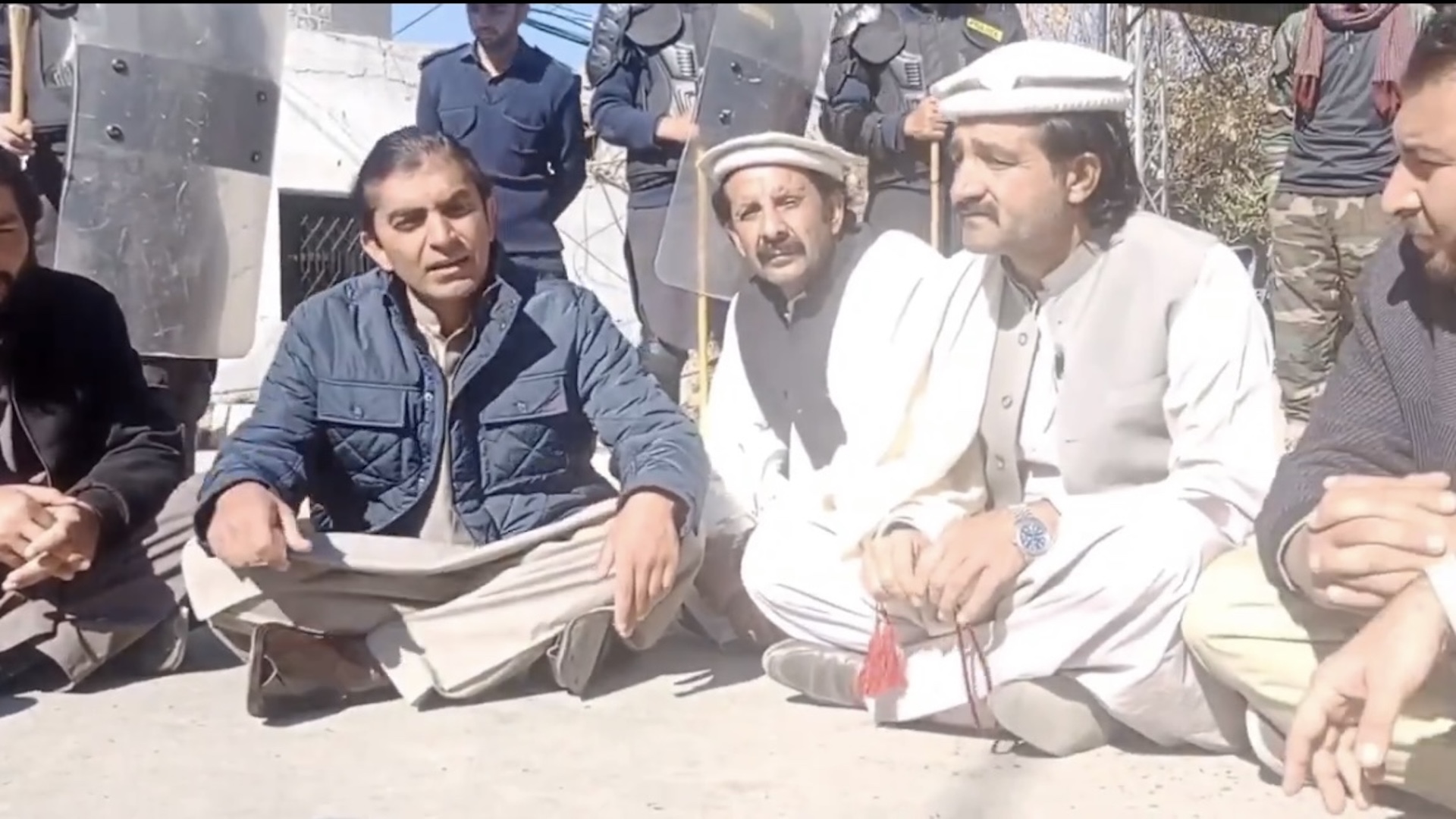This report is part of Dissent Today’s special series documenting violence and alleged irregularities during Pakistan’s 2024 general elections.
When Mohsin Dawar narrowly escaped an elaborate assassination attempt in which his vehicle was sprayed with more than 60 bullets about a month before the 2024 general elections, he saw no option but to slow down his campaign. He was seeking re-election to a National Assembly seat from his hometown of North Waziristan — a restive tribal district of Pakistan’s Khyber-Pakhtunkhwa province that borders Afghanistan and is one of the areas in the country worst affected by Taliban militancy and the war on terror.
On the morning of Jan. 3, Dawar’s corner meetings planned in the village of Tappi, North Waziristan, had to be abruptly cancelled when his vehicle came under attack from around 15 assailants from the Tehreek-e-Taliban Pakistan (TTP). He survived the attack because the vehicle was armoured, but the attackers — determined to get him — launched another attack as more militants joined in from across Waziristan.
As Dawar was whisked away to safety at a home in the village, his private security and the police guarding his convoy sought help from the Pakistan Army to fight the attackers. But they received no response or assistance. Despite this, they continued to engage the militants and were able to drive them away after 45 minutes of violent clashes involving live ammunition and heavy weapons.
“It was a miracle I survived that attack,” Dawar told Dissent Today in a phone interview, saying that his supporters, people from his tribe, and the police were on their own against the militants, with no assistance from the military. After this near-death experience, he had to end his participation in campaign events due to security concerns, relying on his party colleagues and supporters to convey his campaign message.
Dawar, who heads the progressive National Democratic Movement (NDM) that he founded in 2021 along with a group of secular Pashtun politicians, has been vocal against the resurgence of Taliban terrorism in Khyber-Pakhtunkhwa during his time in the National Assembly from 2018 to 2023. During an in-camera meeting of the parliament’s National Security Committee held in 2022 to discuss the rise in terrorism in the province, Dawar was reportedly the only member to challenge then-Inter Services Intelligence (ISI) chief Faiz Hameed about the military’s decision to negotiate with the Taliban.
Even before he began his 2024 election campaign, he heard threats and warnings that the Taliban wanted to target him. Following the attack in Waziristan, personnel from the security agencies warned him that this time the militants had sent a suicide bomber who was roaming around his chamber in the town of Miranshah, disguised as one of his many guests and waiting to hug him.
Khyber-Pakhtunkhwa has a bloody history of election violence, with candidates and representatives of secular parties being attacked by militants in the lead up to the polls. Like a number of other anti-Taliban candidates in the province, Dawar had to go to the polls amid this wave of fear, but he and his followers remained determined not to end the campaign.
The former lawmaker could not stay in one city for more than three days and would travel from Waziristan to Peshawar to Islamabad and back, just to thwart another potential assassination attempt. “Due to this, there was virtually no election campaign,” Dawar said, adding that his supporters remained on the ground, but it was hard for the party to counter the opponents’ narrative because of his absence from campaign activities.
These threats, however, were not the only hurdle in their way. Just weeks before the elections, the Election Commission of Pakistan (ECP) altered the electoral scheme in Waziristan, moving 56 polling stations from areas that Dawar believed were his strongholds to less accessible locations. The changes were made at the request of the Islamist Jamiat Ulema-e-Islam (JUI-F), one of Dawar’s main opponents, whose candidate would later be declared the winner in this constituency.
Most of these polling stations were moved to properties owned by or in use by members or leaders of the JUI-F, which Dawar and his supporters feared could be used as leverage against them.
The JUI-F’s request to change these polling stations was initially rejected, but the election officials overseeing the process later accepted the demand abruptly. Dawar says his sources in the civil administration informed him that the relevant officials had to approve the application after being pressured to do so by military officials.
The NDM wrote applications to the district returning officer and the ECP, expressing concerns over this change, but received no response.
Despite this series of setbacks, the newly formed NDM had fielded 17 candidates for national and provincial assembly seats and was eager to navigate its first general election. Dawar said the party had conducted multiple training sessions for its polling agents to thwart rigging attempts. “We considered every scenario [of electoral rigging] and trained our polling agents accordingly.”
But Election Day on Feb. 8 arrived with yet another act of terror: a suicide attack targeting NDM’s three female polling agents in the same village where Dawar had earlier survived an assassination attempt. Although the women were not physically injured, the trauma left them unconscious, forcing them to abandon their duties.
Dawar later heard reports that the Taliban had taken over some polling stations in the village. “We wrote to the ECP about this attack on our polling agents and the militants taking control of the polling stations, but we did not hear back,” he said.
As unofficial election results began to emerge, reports surfaced that a Returning Officer (RO) — the main official responsible for consolidating results — was tampering with votes in the constituency and increasing the JUI-F’s count. Dawar went to the RO’s office located in the Miranshah cantonment area and confronted him with information he had received about the tampering. “The RO denied altering the results. But he later disappeared, and we could not find him all day,” Dawar says. The RO’s mysterious disappearance led to unusual delays in the counting process.
Dawar and other candidates stayed the night at the building, waiting to receive an update. On the night of Feb. 9, they were informed that the pending results from the Mir Ali district wouldn’t be received until the next day. Since the counting was delayed until then, candidates were asked to leave the office and return the following morning. At the time they left the RO’s office that night, Dawar was leading by more than 5,000 votes.
But they woke up next morning to a hurriedly issued notification from the ECP for the provincial assembly seat of PK-103, where a candidate who had been trailing by a significant number of votes since the voting day, was declared the winner.
“That’s when we realized they were completely distorting the results,” Dawar says.
Two days before the election, Dawar had issued a video message predicting that election officers may change the final results on Form 45, a crucial document used in Pakistan’s post-electoral process, which discloses the outcomes of the voting procedure at a particular polling place.
“That’s exactly what they later did to us and many other candidates across Pakistan,” he says.
When Dawar and his supporters arrived at the RO’s office in Cantonment area once again that morning, they were stopped at the gate, which was sealed by security forces.
According to Pakistan’s election laws, candidates and their polling agents are entitled to be present at the location where votes are being counted and gathered. But no candidates were being allowed to enter the premises, in violation of the law.
After being denied entry, Dawar and his supporters began a protest outside the building, demanding access to the RO’s office. “Our concern was that our mandate was being stolen inside,” Dawar said.
As the protesters marched toward the RO’s office, chanting slogans, security forces stationed at the gate suddenly opened fire on them. Dawar was the first to be hit, receiving two bullets in his right leg. Three of his supporters died on the spot from the gunfire, while another succumbed to his injuries at a hospital. 15 other protestors were injured.
Dawar was rushed to a nearby hospital in Waziristan. As he received treatment for his bullet wounds at the hospital, a candidate from the JUI-F was announced the winner from the constituency.
Pakistan’s mainstream media conducted marathon transmissions covering the elections, but this incident of election violence targeting a former parliamentarian barely registered in the mainstream media. On the contrary, sections of the media reported it as an attack on the Pakistani military, airing misleading claims from government officials that Dawar’s supporters had attacked security forces and injured policemen.
Miranshah district administration officials had claimed at the time that Dawar’s supporters tried to force their way into the building and injured policemen in the process. However, according to two Waziristan-based reporters Dissent Today spoke to, the local police denied that their personnel were killed or injured in the incident, disputing the official version that held the protesters responsible.
Then-interim Prime Minister Anwaar Kakar repeated these accusations during a media briefing, and most media outlets reported the questionable official version, which cleared the security forces of responsibility for opening fire at the protest.
“I did not expect them to shoot,” Dawar said, adding that he wouldn’t have staged a protest and endangered his supporters’ lives if he had known the security forces would open fire on them.
Three of the men killed in the gunfire were under 30 years of age, while one was in his late 40s.
After initial treatment in Waziristan, Dawar was moved to a hospital in Peshawar for better medical care, where he remained under treatment for four days. During this time, no mainstream politician — including those who were once his allies in the Pakistan Democratic Movement — reached out to him to inquire about his health. Prime Minister Shehbaz Sharif, who called him to ask for details about the incident, was the only exception.
A year after this incident, no FIR has been registered for the killing of the four protesters, as authorities rejected Dawar’s application for a case and registered a counter FIR against him and his supporters in response. Their complaint before the election tribunal regarding alleged rigging in the constituency has not been heard either and continues to face delays.
Dawar says he had expected to face hurdles during the election but had not anticipated that the establishment would go to such lengths to keep him away from Parliament.
His sources among security agencies often tell him that the main reason he is unacceptable to the powers that be is his stance against the Taliban. “Many political forces in Khyber-Pakhtunkhwa chose to accept the Taliban as a reality after they gained ground in the province,” Dawar says, but adds that his party will never accept the militant group’s presence in the region.
“We are not willing to compromise on any part of our narrative,” he says.
- Additional reporting by Rai Bhittani in North Waziristan.

The writer is a journalist and the Founding Editor of Dissent Today. She covers politics, human rights, and religious extremism. She tweets at @AiliaZehra.

